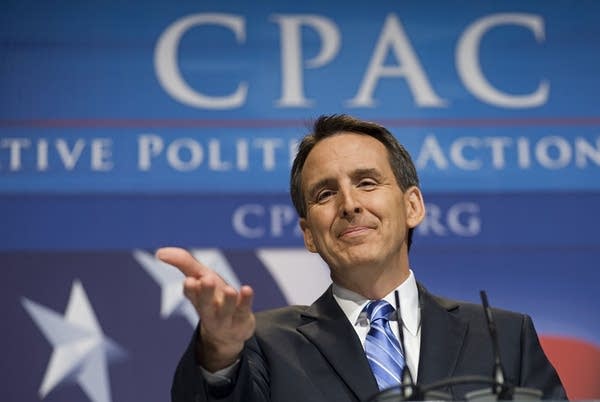Ruling is blow to Pawlenty's political ambitions
Go Deeper.
Create an account or log in to save stories.
Like this?
Thanks for liking this story! We have added it to a list of your favorite stories.

The Minnesota Supreme Court's decision to reverse some of Gov. Tim Pawlenty's budget cuts is a serious blow to his efforts to fix the state's sagging finances. The ruling may also have crimped his wider political ambitions.
For months, Pawlenty has been traveling the country talking about his work. He's on a list of possible 2012 presidential candidates, and wherever he goes, he walks some familiar political ground.
Pawlenty often talks about his single-handed efforts to solve the state's budget crisis, in what's known as unallotment -- his power to cut the state budget or delay payments without the Legislature's approval.
"We talk a lot about spending, and the deficit and the debt," Pawlenty told attendees at a fundraiser or the Alabama Republican Party in February.
Turn Up Your Support
MPR News helps you turn down the noise and build shared understanding. Turn up your support for this public resource and keep trusted journalism accessible to all.
"So 49 states have to balance their budget -- constitutionally required," Pawlenty said. "It works. I mean, it's difficult. We gotta make tough decisions. We gotta fight with legislators. I unilaterally unalloted almost $3 billion. I got sued. I'm in litigation. It's a big battle, but it gets done."
And now, it's been undone.
The state Supreme Court ruling struck down Pawlenty's withdrawal of funding for a nutrition program for the poor. That decision could unwind his entire plan to solve a $2.7 billion budget crisis a year ago. By a 4-3 majority, the court said the governor exceeded his statutory authority when he balanced the state budget on his own after the Legislature adjourned.
"This was the ace up his sleeve, but the card's gone now, and it's hard to know now how this will all work out," said Steven Schier, a political science professor at Carleton College in Northfield. "He can't really point to that sort of fiscal accomplishment as sort of a distinguishing characteristic of his campaign. It's not really there any more."
Schier thinks it'll be hard to come up with another victory, with less than two weeks left in the legislative session. Given the court's decision, the state is back to square one on a budget deficit expected to top $3 billion.
Pawlenty still counts unallotment as a victory.
"We took matters into our own hands, because we didn't have the Legislature agreeing with us last summer," he told reporters after the court's decision. "So it remains true that we attempted to deal with it on my own."
Political observers say that may very well be good enough.
Although Pawlenty can't claim to have single-handedly righted the state's financial ship, he'll receive credit among the nation's Republican faithful for trying, said Jennifer Duffy, a political analyst with the Washington-based Cook Political Report.
"He can talk about the process of how budgeting is done, and how governors probably need more authority than they already have," Duffy said. "He can run on the need for a line-item veto. And while it certainly would be better to run with it as a major accomplishment, there's some mileage to be had."
Also, there are some aspects of the court decision that may work in Pawlenty's favor.
Ben Smith, who writes a national politics blog for Politico.com, said the court's decision has a political upside for the governor, who is trying to raise his national profile.
"It highlights the fact that he's fighting," Smith said. "The conflict in a way in the sense that he fought this all the way up to the top court and that's what Republicans want to see."
Beyond that, the decision could cast Pawlenty as an unbending opponent not just of taxes, but also of what Republicans consider 'judicial activism,' Smith said.
Even though one of his own court appointments, Chief Justice Eric Magnuson, wrote the ruling against his unallotment decision, the governor has already started making that case.
"Well, the decision itself is certainly disappointing. I disagree with it strongly," Pawlenty said of the ruling. "When you have a statute that is at worst ambiguous, you should defer to the statute, to a minimalist interpretation of it. Instead a group of judges on the court took an expansive interpretation and I think it's an unfortunate, unwise decision."
Pawlenty is expected to meet with legislative leaders today to try to come up with a fiscal alternative to the unallotment struck down by the court.




